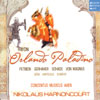Haydn Orlando Paladino
When the fare is as tasty as this a little ham doesn’t spoil the feast
View record and artist detailsRecord and Artist Details
Composer or Director: Joseph Haydn
Genre:
Opera
Label: Deutsche Harmonia Mundi
Magazine Review Date: 10/2006
Media Format: CD or Download
Media Runtime: 141
Mastering:
Stereo
DDD
Catalogue Number: 82876 73370-2

Tracks:
| Composition | Artist Credit |
|---|---|
| Orlando Paladino |
Joseph Haydn, Composer
Christian Gerhaher, Rodomonte, Baritone Elisabeth von Magnus, Alcina, Soprano Florian Boesch, Caronte, Bass Johannes Kalpers, Licone Joseph Haydn, Composer Malin Hartelius, Eurilla, Soprano Markus Schäfer, Pasquale, Tenor Michael Schade, Orlando, Tenor Nikolaus Harnoncourt, Conductor Patricia Petibon, Angelica, Soprano Vienna Concentus Musicus Werner Güra, Medoro, Tenor |
Author: David Vickers
Nikolaus Harnoncourt boldly proclaims that Orlando Paladino “is one of the best works in 18th-century music theatre”. Written to commemorate a visit by Russian royalty to Eszterháza that never materialised, Orlando Paladino was first performed on December 6, 1782, in celebration of Prince Nikolaus’s name-day. Harnoncourt believes that Haydn “takes to its logical extreme the fusion of pathos and irony, sincere feelings with parody, puffed-up heroics with cowardice, insanity with tranquilisers and normal reactions with exaggerated outbursts…Haydn interferes musically in the confusion to a point where the listener cannot distinguish healthy from sick or amorous yearning from dangerous lunacy”.
Sabine Gruber’s conversational essay explains how Haydn’s musical portraits show an astute affection for Ariosto’s epic poem (the same literary source as the great Orlando operas by Handel and Vivaldi). Although Haydn’s Orlando Paladino seems part-pantomime, part-fantasy, these characters are never conscious that they are not what they protest to be. Like Ariosto, Haydn lets the audience in on the joke but the characters remain blissfully oblivious to the hypocrisy or naivety of their richly ironic statements to themselves and each other.
Harnoncourt’s exemplary team of singers deliver deadpan comedy. For instance, Werner Güra takes on an opera seria posture as the romantic “hero” Medoro in “Parto, Ma, oh Dio”: the glorious musical language suggests he suffers from sincere passion, but his real motivation is cowardice. One imagines that Patricia Petibon’s Angelica is merely emulating the heroic fidelity and courage of women like Mozart’s Konstanze but during “Non partir, mia bella face” one suspects that there is sincerity in her after all: Angelica is facing possible abandonment and her vulnerability shows through. Michael Schade’s voice is smokier than it used to be but his powerful resonant high notes, expressive weight and authority suggest that Orlando is more victim than villain. Only the comic secondary roles sung by Markus Schäfer and Malin Hartelius get hammed up, but they each sing with élan.
There is a vivid sense of dramatic intensity in this live concert recording. It is historically absurd to employ a lute as part of the continuo team in a late-18th-century opera but Harnoncourt leads Concentus Musicus Wien through a fizzing theatrical performance. This is comfortably among the finest Haydn opera recordings, although the stingy omission of scene numbers and stage directions from the libretto is unhelpful.
Sabine Gruber’s conversational essay explains how Haydn’s musical portraits show an astute affection for Ariosto’s epic poem (the same literary source as the great Orlando operas by Handel and Vivaldi). Although Haydn’s Orlando Paladino seems part-pantomime, part-fantasy, these characters are never conscious that they are not what they protest to be. Like Ariosto, Haydn lets the audience in on the joke but the characters remain blissfully oblivious to the hypocrisy or naivety of their richly ironic statements to themselves and each other.
Harnoncourt’s exemplary team of singers deliver deadpan comedy. For instance, Werner Güra takes on an opera seria posture as the romantic “hero” Medoro in “Parto, Ma, oh Dio”: the glorious musical language suggests he suffers from sincere passion, but his real motivation is cowardice. One imagines that Patricia Petibon’s Angelica is merely emulating the heroic fidelity and courage of women like Mozart’s Konstanze but during “Non partir, mia bella face” one suspects that there is sincerity in her after all: Angelica is facing possible abandonment and her vulnerability shows through. Michael Schade’s voice is smokier than it used to be but his powerful resonant high notes, expressive weight and authority suggest that Orlando is more victim than villain. Only the comic secondary roles sung by Markus Schäfer and Malin Hartelius get hammed up, but they each sing with élan.
There is a vivid sense of dramatic intensity in this live concert recording. It is historically absurd to employ a lute as part of the continuo team in a late-18th-century opera but Harnoncourt leads Concentus Musicus Wien through a fizzing theatrical performance. This is comfortably among the finest Haydn opera recordings, although the stingy omission of scene numbers and stage directions from the libretto is unhelpful.
Discover the world's largest classical music catalogue with Presto Music.

Gramophone Digital Club
- Digital Edition
- Digital Archive
- Reviews Database
- Full website access
From £8.75 / month
Subscribe
Gramophone Full Club
- Print Edition
- Digital Edition
- Digital Archive
- Reviews Database
- Full website access
From £11.00 / month
Subscribe
If you are a library, university or other organisation that would be interested in an institutional subscription to Gramophone please click here for further information.




